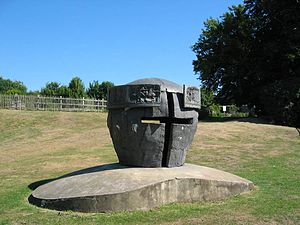
Back لوئیس دؤیوشو AZB Bitva u Lewes Czech Schlacht von Lewes German Batalla de Lewes Spanish نبرد لوئس Persian Bataille de Lewes French קרב לואס HE Battaglia di Lewes Italian ルイスの戦い Japanese Bitwa pod Lewes Polish
| Battle of Lewes | |||||||
|---|---|---|---|---|---|---|---|
| Part of Second Barons' War | |||||||
 Plan of the Battle of Lewes | |||||||
| |||||||
| Belligerents | |||||||
| Royal forces | Baronial forces | ||||||
| Commanders and leaders | |||||||
| |||||||
| Strength | |||||||
| ~10,000 | ~5,000 | ||||||
| Casualties and losses | |||||||
| 2,700 | Unknown | ||||||

The Battle of Lewes was one of two main battles of the conflict known as the Second Barons' War. It took place at Lewes in Sussex, on 14 May 1264.[1] It marked the high point of the career of Simon de Montfort, 6th Earl of Leicester, and made him the "uncrowned King of England". Henry III's forces left the safety of Lewes Castle and St. Pancras Priory to engage the barons in battle and were initially successful, with Henry's son Prince Edward routing part of the baronial army with a cavalry charge. However, Edward pursued his quarry off the battlefield and left Henry's men exposed. Henry was forced to launch an infantry attack up Offham Hill where he was defeated by the barons' men defending the summit. The royalists fled back to the castle and priory and the King was forced to sign the Mise of Lewes, ceding many of his powers to de Montfort.
- ^ Maurice Keen (1999). Medieval Warfare: A History. OUP Oxford. p. 309. ISBN 978-0-19-164738-3.